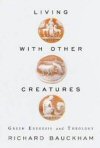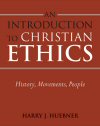Baylor Ethics Collection (4 vols.)
Digital Logos Edition
Overview
This collection of Baylor volumes presents valuable writing on general Christian ethics, as well as on important topics such as pacifism and ecological issues. Harry J. Huebner’s massive, An Introduction to Christian Ethics represents a new standard in Christian ethics studies, covering important ancient, modern, and postmodern traditions and figures in Christian ethics. Living with Other Creatures and Greening Paul represent current scholarship on the relationship between Christianity, Scripture, and ecological ethics. Finally, Nonviolence: A Brief History presents, for the first time in one edited volume, the influential Warsaw lectures delivered by one of the most important pacifists in modern Christianity, John Howard Yoder. This volume not only covers a wide range of ethical issues, but also serves as an overview of the theological and ethical thought of Yoder himself.
The Logos Bible Software edition of these volumes is designed to encourage and stimulate your study and understanding of Christian ethics. Scripture passages link directly to your English translations and original-language texts, and important theological concepts link to dictionaries, encyclopedias, and a wealth of other resources in your digital library. In addition, you can perform powerful searches by topic and find what other authors, scholars, and theologians have to say about pacifism and ecological ethics.

Key Features
- Timely discussion of issues in ecological ethics and pacifism
- Extensive introduction to Christian ethics
Product Details
- Title: Baylor Ethics Collection
- Publisher: Baylor University Press
- Volumes: 4
- Pages: 1,372
Individual Titles
- Living with Other Creatures: Green Exegesis and Theology by Richard Bauckham
- Greening Paul: Rereading the Apostle in a Time of Ecological Crisis by David G. Horrell, Cherryl Hunt, and Christopher Southgate
- An Introduction to Christian Ethics by Harry J. Huebner
- Nonviolence: A Brief History: The Warsaw Lectures by John Howard Yoder

Aiming to develop Christian thought on ecological ethics, Richard Bauckham mines Scripture and theology, discovering a firm command for Christians to care for all of God’s creation. Bauckham goes on to survey and discuss the generations of theologians who have sought to live out this biblical mandate. Reshaping the often misunderstood biblical notion of human dominion, Living with Other Creatures consults Scripture in its entirety and includes Jesus’ perspectives on creation, novel approaches to reading the gospels, and some of the most well-known “ecologists” throughout Christian history. The result is an innovative and enriching treatise that reminds readers of God’s whole creation—and humanity’s place within it.
[Bauckham’s] mature reflection has resulted in a book that is exegetically and theologically rewarding.
—Beverly Roberts Gaventa, Helen H. P. Manson Professor of New Testament Literature and Exegesis, Princeton Theological Seminary
In this exciting volume, Bauckham weaves together Jesus’ teaching of the kingdom of God, the Jewish traditions of animal compassion, St. Francis, the Apocalypse, and Christian mystics to make the case that creation’s praise of God—independent of humans—is foundational to the Christian tradition. The result is an important, highly recommended reading of the biblical mandate for ethical engagement in today’s ecological crises.
—Barbara Rossing, professor of New Testament, Lutheran School of Theology, Chicago
Filled with intelligence and serious scholarship, Living with Other Creatures carries a deeply important message. A very valuable contribution.
—Roger S. Gottlieb, professor of philosophy, Worcester Polytechnic Institute
A significant biblical, theological, and historical resource for the desperately needed ‘greening’ of the Christian faith. Bauckham’s collection deserves very wide attention.
—David P. Gushee, distinguished university professor of Christian ethics, Mercer University
Bauckham reminds the reader that, as Creator, God delights in and cares for all creation. ... He wishes to recover the biblical view of human solidarity with the rest of creation by establishing creation’s own inherent value.
—Bill Walker, Christianity Today
Richard Bauckham was professor of New Testament studies at St Mary’s College, University of St Andrews. He recently retired from this position in order to concentrate on research and writing. He currently is the senior scholar at Ridley Hall in Cambridge and visiting professor at St. Mellitus College. Bauckham studied at the University of Cambridge and was a fellow of St John’s College. He taught theology for one year at the University of Leeds and for 15 years at the University of Manchester before teaching at the University of St. Andrews. He is a fellow of the British Academy and a fellow of the Royal Society of Edinburgh.

Greening Paul, a remarkable, wide-ranging attempt to read the Pauline literature from an ecological perspective, is the first book of its kind. The authors seek to present an ethically challenging reading of Paul without subjugating the Bible to a contemporary set of ethical values. The authors craft their reading of Paul according to the cutting-edge insights of narrative criticism and tackle burning questions which assail Christians in the present ecological crisis: “Does the biblical tradition inculcate an anthropocentric worldview that gives humanity license to exploit the earth for our benefit? Does biblical eschatology imply that the earth is of only passing significance for the elect?” Greening Paul is a timely and adroit re-reading of the apostle Paul that seeks to provide a fruitful ecological vision, all the while staying true to the biblical text.
Greening Paul is an important and welcome contribution to the development of theology in our ecological era. Broad in its research and clear in its methods, this book reads Pauline Scriptures carefully and creatively, and offers a model of how to read Scripture in conversation with theology and science. It will be a useful resource for scholars, students, and church study groups.
—Willis Jenkins, Margaret Farley Assistant Professor of Social Ethics, Yale University
If Paul wrote to address problems in his own communities in the first century, what can his letters possibly offer about the environmental crisis that faces us today? The authors of Greening Paul argue convincingly that Paul’s notions of participation in Christ and reconciliation are cosmic categories and that God’s saving purposes include the whole universe and not just human beings. They construct a valuable hermeneutical lens through which they read the Pauline letters and shape a ecotheology and ecoethics. Essentially carving out a new theological field, their ecological analysis is insightful and their exegetical conclusions sound—a work well worth engaging.
—Tatha Wiley, professor of theology, University of St. Thomas and the College of St. Catherine, St. Paul, Minnesota
This admirable study demonstrates that carefully-ground ‘hermeneutical lenses’ can focus and clarify one’s perception of the implicit eco-theology and ethics in the Pauline letters.
—Victor Paul Furnish, distinguished university professor emeritus of New Testament, Southern Methodist University
This well-written and carefully argued collaborative investigation is a must-read for environmental ethicists, biblical scholars, theologians, church practitioners, and their students.
—H. Paul Santmire, senior pastor, Trinity Lutheran Church, Akron, Ohio
David G. Horrell is professor of New Testament studies and director of the Centre for Biblical Studies at the University of Exeter.
Cherryl Hunt is an associate research fellow of the University of Exeter
Christopher Southgate is a research fellow of the University of Exeter and dean of Studies of the South West Ministry Training Course.

In this pedagogically astute introduction, Harry Huebner approaches Christian ethics as theology embodied in the lives of real people. He maintains that matters of justice, poverty, power, and violence too often go without the appropriate Christian response—the “Word becoming Flesh.” In this extensive volume, Huebner skillfully addresses the ethical challenges raised by social philosophers as well as Latin American, African American, Aboriginal, feminist, and peace theologians. An Introduction to Christian Ethics spans the centuries—from Athens to contemporary America and beyond—and collects some of the most influential voices in Christian ethics on both classical theories and contemporary moral issues. Huebner seeks to provide teachers and students with a solid foundation upon which to build a faithful approach to ethical thought and practice.
By placing the great figures of Christian tradition historically and biographically, Huebner illumines both their unique particularity and the ways in which they are models for today. Readers will be rewarded with new insights into ‘thinkers’ who come alive as ‘believers’ and ‘practitioners.’
—Lisa Sowle Cahill, Monan Professor of Theology, Boston College
Huebner’s introduction presents an accurate, reliable, and comprehensive historical argument. Truly impressive in scope, it offers a recovery of Jesus in Christian ethics that is ecclesiologically engaged. I can only celebrate this huge accomplishment!
—Glen Stassen, Lewis B. Smedes Professor of Christian Ethics, Fuller Theological Seminary
This book does the impossible—it brings together a breadth of histories, persons and movements who constitute the core of Christian ethics in antiquity, modernity, and post-modernity without sacrificing substance. An Introduction to Christian Ethics is clear, profound and a thoroughly enjoyable read and now sets the standard as the reference book for the discipline.
—D. Stephen Long, professor of systematic theology, Marquette University
A strength of this text’s approach to Christian ethics is Huebner’s conviction that ‘discipleship learning is more than mere head learning.’ Such learning involves observation of Christian mentors’ lives along with their ethical discourse and appropriation of their teaching as students deepen practice of the form of life and community that has grown from God’s work in Jesus Christ. In this text, valuable both for college and seminary students, Huebner selects a variety of nineteenth- and twentieth-century ethicists for this kind of careful examination and inspiration.
—Gayle Gerber Koontz, professor of theology and ethics, Associated Mennonite Biblical Seminary
Harry J. Huebner is professor emeritus of theology and philosophy at Canadian Mennonite University in Winnipeg, Manitoba. He is the author of Echoes of the Word: Theological Ethics as Rhetorical Practice.

Few theologians have done as much as John Howard Yoder to articulate the case for Christian pacifism. The 11 lectures collected in Nonviolence: A Brief History were presented in 1983 in Warsaw, Poland, and this is their first publication together. Despite their apparent diversity, the lectures trace a single trajectory: the increasing relevance of nonviolent thought and action. They argue that nonviolence aligns with the inner logic of the world and, therefore, with human social existence. A quarter-century after they were delivered, Yoder’s remarks seem prophetic, heartfelt, and essential. For those unfamiliar with the life and thought of John Howard Yoder, these lectures, together with their accompanying brief contextualizing summaries, provide an easily accessible introduction.
For anyone who wants a cogent defense of non-violence from within the Christian tradition, this is as fine a place to start as anywhere.
—Tim Gorringe, The Journal of Theological Studies
These are priceless lectures. Drawing from the spiritual wells of contemporary visionaries, Yoder unmasks the redemptive power of reconciliation.
—Daniel G. Groody, assistant professor of theology, University of Notre Dame
These lectures wonderfully convey Yoder’s depth and breadth of knowledge and his respectful engagement with the Roman Catholic tradition.
—Mark Thiessen Nation, professor of theology, Eastern Mennonite Seminary
These recently discovered lectures represent a significant addition to our understanding of Yoder’s published thought on war and nonviolence.
—Ronald J. Sider, professor of theology, holistic ministry and public policy, Palmer Seminary, Eastern University
[T]his book is a welcome addition to Yoder's published corpus of work.
—Paul Doerksen, The Mennonite Quarterly Review
The collection is eminently readable and offers glimpses and insights into Yoder’s thought without being too difficult . . . [A] text highly recommended to those interested in the contemporary discussion surrounding questions of Christians and violence, the role of nonviolence and Christianity, and just war theory.
—Reviews in Religion and Theology
John Howard Yoder (1926–1997) was a Mennonite theologian, whose writings had a major impact on Christian thought and social ethics. He was professor of theology in the Department of Theology and a teaching fellow in the Joan B. Kroc Institute for International Peace Studies, both at the University of Notre Dame.